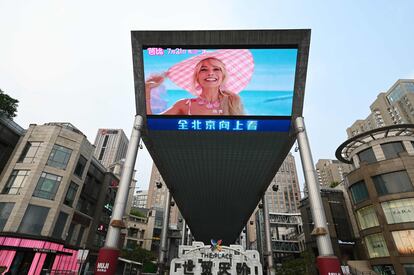‘Barbie’ ignites debate on China’s territorial ambitions
Vietnam refuses to screen the American film due to an allegedly pro-Beijing map

The South China Sea is a strategic body of water in Southeast Asia that is often considered the most likely flashpoint for a conflict between China and the United States. However, out of all the possible causes of tension in the area, few could have foreseen that the Barbie movie would be one of them. Greta Gerwig’s film has faced resistance among some of China’s neighbors like Vietnam and the Philippines, as it allegedly depicts a map that “promotes China’s interests” and “violates territorial sovereignty.” Vietnam’s outright ban reflects the country’s determination to protect its rights amid Beijing’s increasing assertiveness in the region.
“China has over a billion people, and film producers need this market. Some say that if [a scene] shows ‘a cow-tongue line,’ then we should just delete the scene. However, by allowing the movie to be shown, we would be sending a message of acceptance,” Tran Thanh Hiep, the director of Vietnam’s National Film Evaluation Council, told Vietnam News. The “cow tongue” is slang for the dotted line China puts on maps around disputed islands it claims as its own. “Vietnam’s position is clear. It does not accept films that are ambiguous in matters related to territorial sovereignty,”said Hiep.
The strife arose from a map of the “real world” that appears behind Barbie (played by Margot Robbie) when she is urged to leave Barbie Land in search of a cure for her inexplicably flat feet. Vietnamese film reviewers objected to a particular detail on the map: a U-shaped dotted line extending down from an area called “Asia” into the South China Sea.
Vietnam says the film deliberately included the “nine-dash line” that Beijing has been using since 1947 (before the People’s Republic of China was established in 1949) to delineate its claims over most of the South China Sea, an important trade route with substantial oil reserves. The line surrounds Taiwan, the self-governing island claimed by China as part of its territory, and encompasses an area of two square kilometers (one square mile), extending from China towards the coasts of Vietnam, Malaysia, Brunei and the Philippines.

A child-like crayon drawing
Warner Bros described the map as a “child-like crayon drawing… It was not intended to make any type of statement.” Vietnam’s cinema gatekeepers insist that “it could lead to misconceptions,” even though the line in the movie has eight dashes instead of the nine used on Chinese maps. The Philippines, which also threatened to ban Barbie, relented and allowed the movie to be shown after blurring the map.
“China’s efforts to consolidate control over the South China Sea pose a significant geopolitical challenge for Vietnam,” says Peter Zinoman, a professor of Southeast Asian history at the University of California, Berkeley. “For Vietnam, the line represents audacious and imperialistic intimidation.” The relationship between these two ideological allies, both governed by the Communist Party, is characterized by distrust due to centuries of Chinese dominance and a history of strife. The most recent conflict was the Sino-Vietnamese War of 1979, followed by border and naval clashes in the 1980s. “The ban on Barbie is a matter of national pride,” adds Zinoman.
“All the boundaries have a scientific basis,” says Wang Ying, a maritime geographer and disciple of Yang Huairen, the Chinese cartographer who created the first map with the controversial nine-dash line. Wang says the 2016 verdict of the Permanent Court of Arbitration in The Hague “ignores history.” The ruling rejected Beijing’s claims to sovereignty over 90% of the South China Sea. Vietnam and the Philippines are at the forefront of the dispute and criticize China for disregarding the ruling. They often accuse China of intimidating their fishing vessels and conducting illegal naval patrols to assert its claims of sovereignty.
China has become increasingly strident regarding its territorial integrity in recent years, particularly when it comes to Taiwan. But throughout the ongoing Barbie saga, Mao Ning, China’s Foreign Ministry spokesperson, has urged against associating the South China Sea issue with cultural exchanges. On Chinese social media platforms, where the nine-dash line has long been seen as a symbol of patriotism, the Barbie map has received widespread praise. On the Weibo microblogging platform, some users applauded Warner Bros for “choosing the right side,” while others called for “more films like this to promote respect” for Chinese sovereignty.
Keeping China’s censors happy
Chinese regulators only allow about 30 foreign films every year from all over the world, not solely Western ones. Co-productions, on the other hand, have a separate set of regulations. “I’m not familiar with this particular map, but it’s true that major studios are super sensitive to any content that might upset China. Hollywood is under tremendous pressure to keep the [Communist] Party’s censors happy.” said renowned China analyst Bill Bishop on his Sharp China podcast.
The US-China Economic and Security Review Commission released a report in 2015, which mentioned that American filmmakers are now editing their movies to accommodate the potential concerns of Chinese censors. Besides adapting scenes to adhere to Chinese restrictions on nudity, violence and depictions of homosexual relationships, Hollywood has also created alternative endings in recent years to make the content more acceptable to the Chinese government.
Industry critics argue that tapping into this immense market of over 1.4 billion potential viewers is becoming more difficult. Barbie had a lackluster opening weekend at the Chinese box office, generating a modest 50 million yuan ($7 million), according to the Maoyan ticketing platform. It ranked fifth among the most-watched films, trailing a number of domestic productions. The state-run Global Times newspaper seized the opportunity to urge Hollywood to respect Chinese audiences who exercise discernment and don’t readily embrace everything exported to them. Nevertheless, the Douban website had mostly positive user reviews, with one woman from Jiangsu saying she appreciated “being able to watch a movie with a gender perspective.”
Barbie is not the first film to encounter opposition from Vietnamese or Filipino authorities regarding the portrayal of the nine-dash line. Vietnam banned Crazy Rich Asians in 2018; both countries pulled the DreamWorks animated film Abominable in 2019; and Uncharted was prohibited in 2022. Netflix had to remove Australian spy drama Pine Gap from its streaming services in Vietnam in 2021 due to two episodes featuring maps that, according to Hanoi, had “upset and hurt the feelings of the entire Vietnamese people.” Only the two episodes in question were removed in the Philippines. Hollywood may consistently favor China over Vietnam, but the latter’s firm stance has effectively ignited a new global discussion about its territorial concerns.
Sign up for our weekly newsletter to get more English-language news coverage from EL PAÍS USA Edition
Tu suscripción se está usando en otro dispositivo
¿Quieres añadir otro usuario a tu suscripción?
Si continúas leyendo en este dispositivo, no se podrá leer en el otro.
FlechaTu suscripción se está usando en otro dispositivo y solo puedes acceder a EL PAÍS desde un dispositivo a la vez.
Si quieres compartir tu cuenta, cambia tu suscripción a la modalidad Premium, así podrás añadir otro usuario. Cada uno accederá con su propia cuenta de email, lo que os permitirá personalizar vuestra experiencia en EL PAÍS.
¿Tienes una suscripción de empresa? Accede aquí para contratar más cuentas.
En el caso de no saber quién está usando tu cuenta, te recomendamos cambiar tu contraseña aquí.
Si decides continuar compartiendo tu cuenta, este mensaje se mostrará en tu dispositivo y en el de la otra persona que está usando tu cuenta de forma indefinida, afectando a tu experiencia de lectura. Puedes consultar aquí los términos y condiciones de la suscripción digital.









































